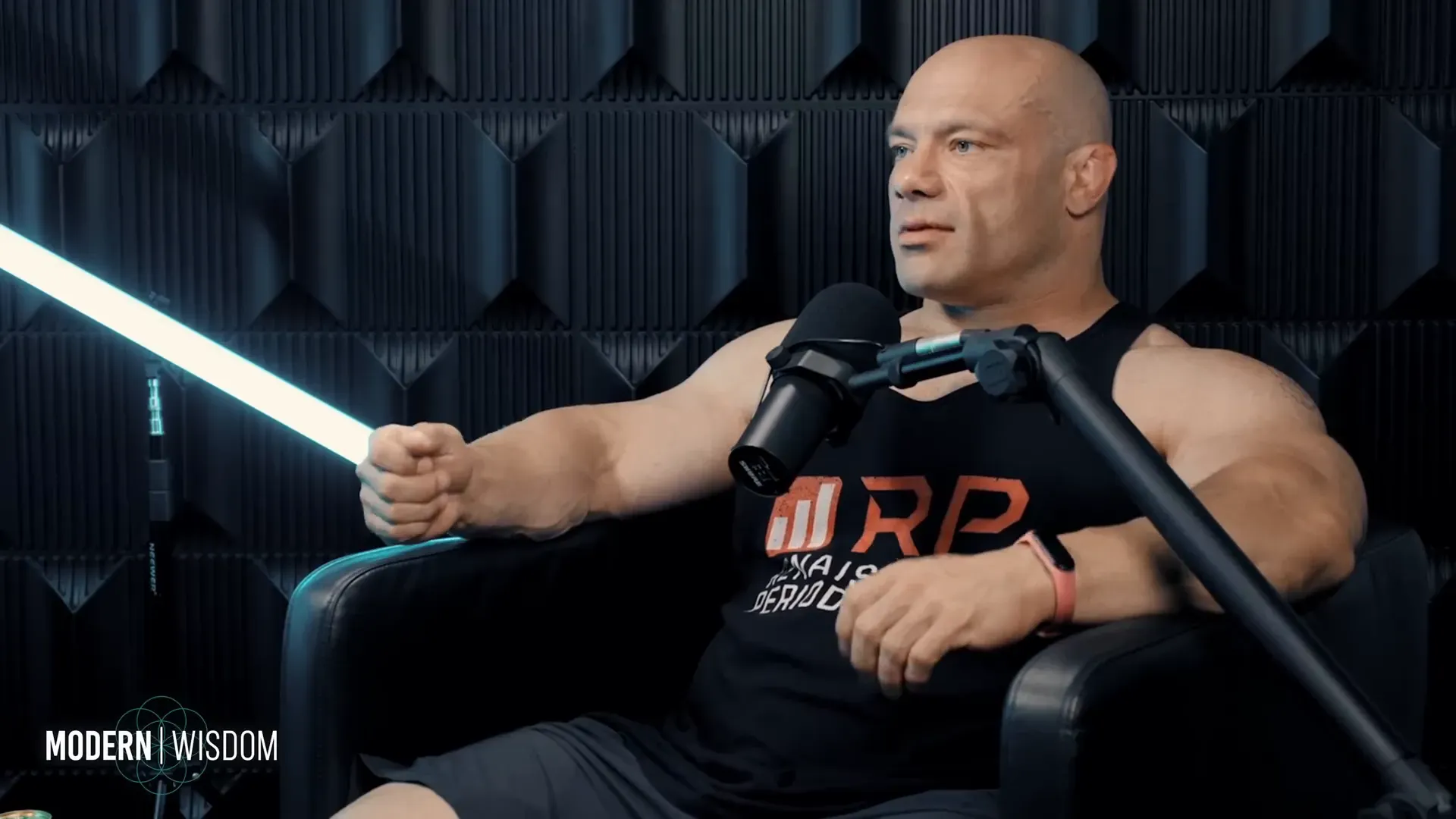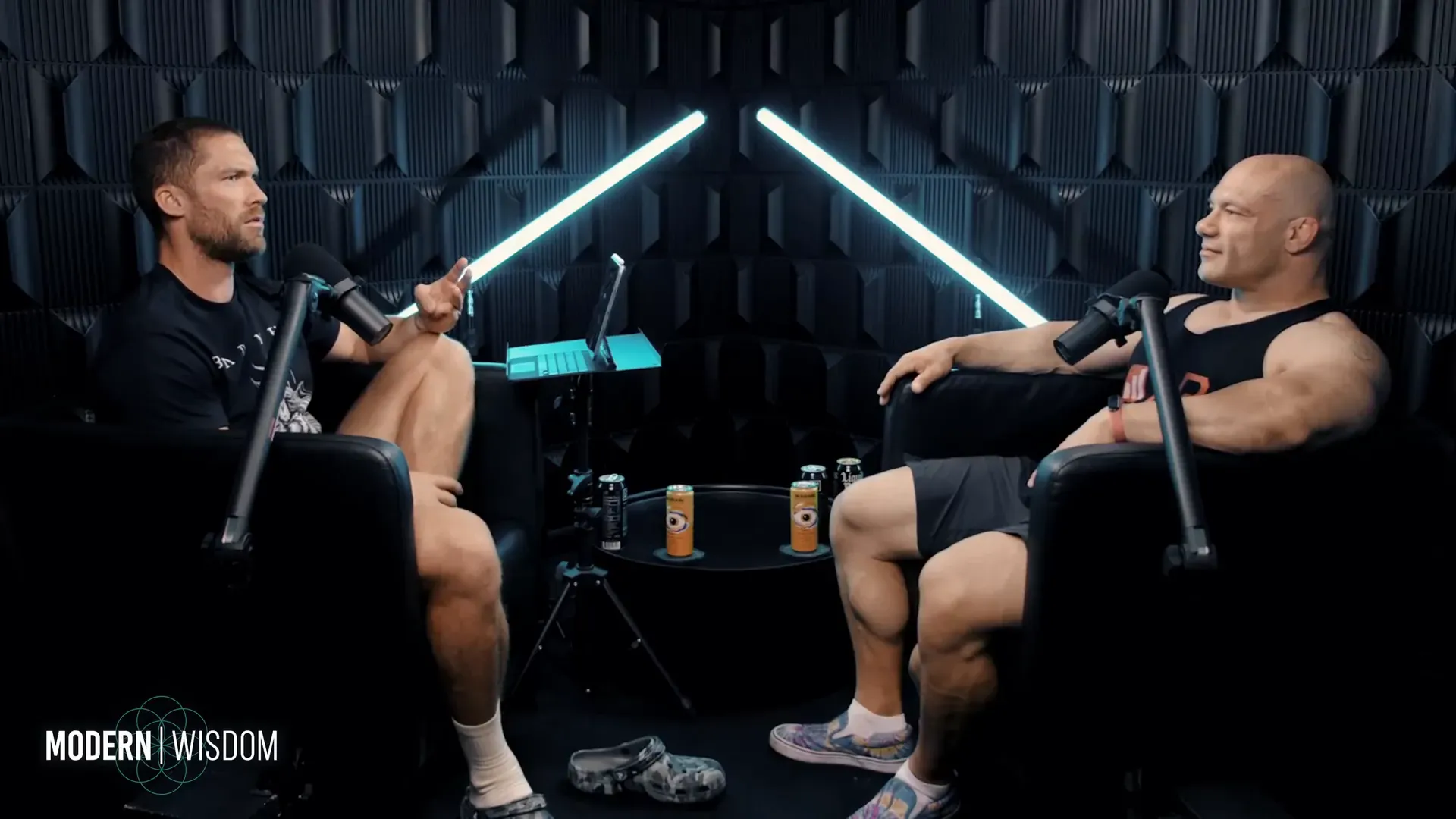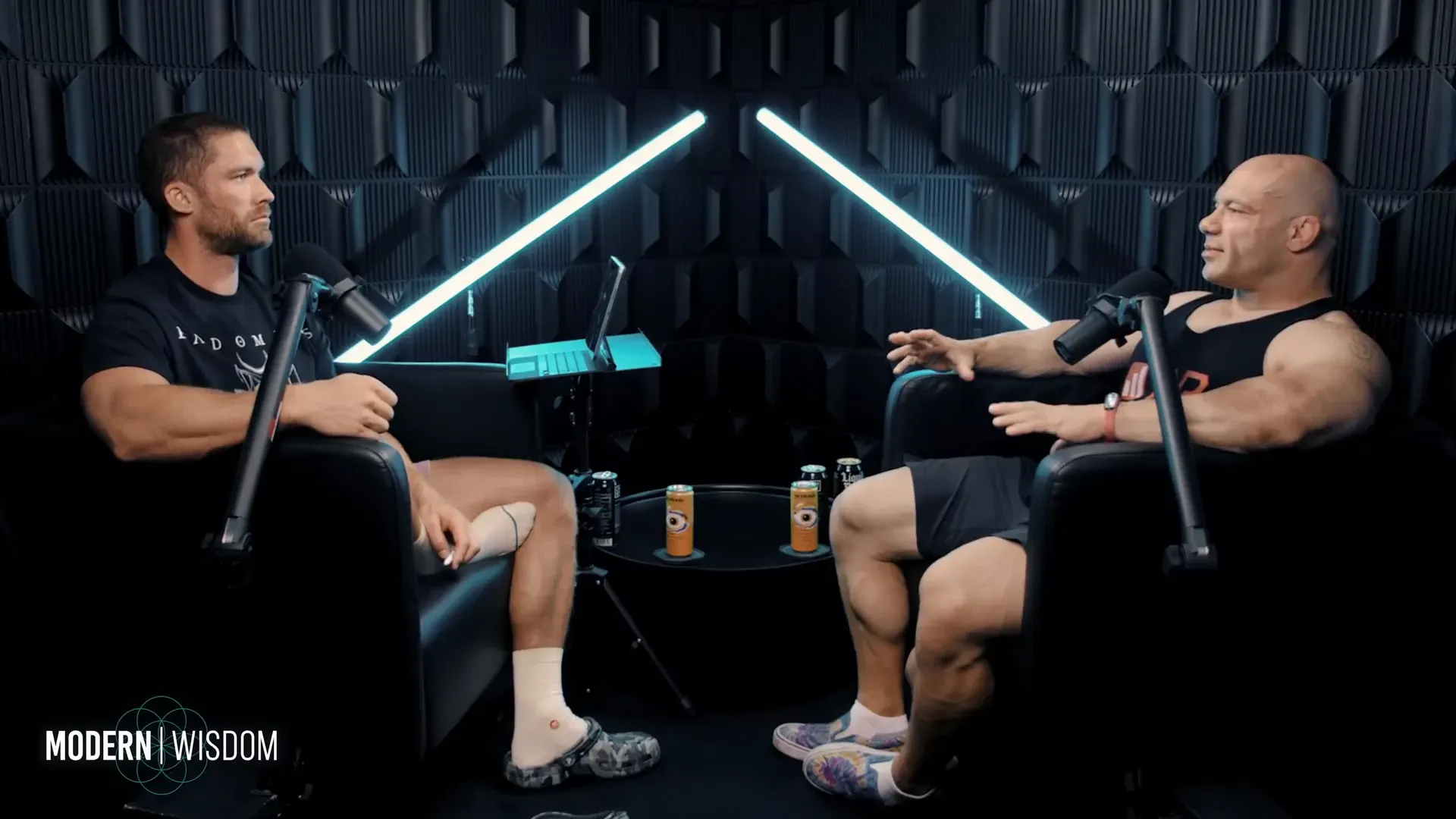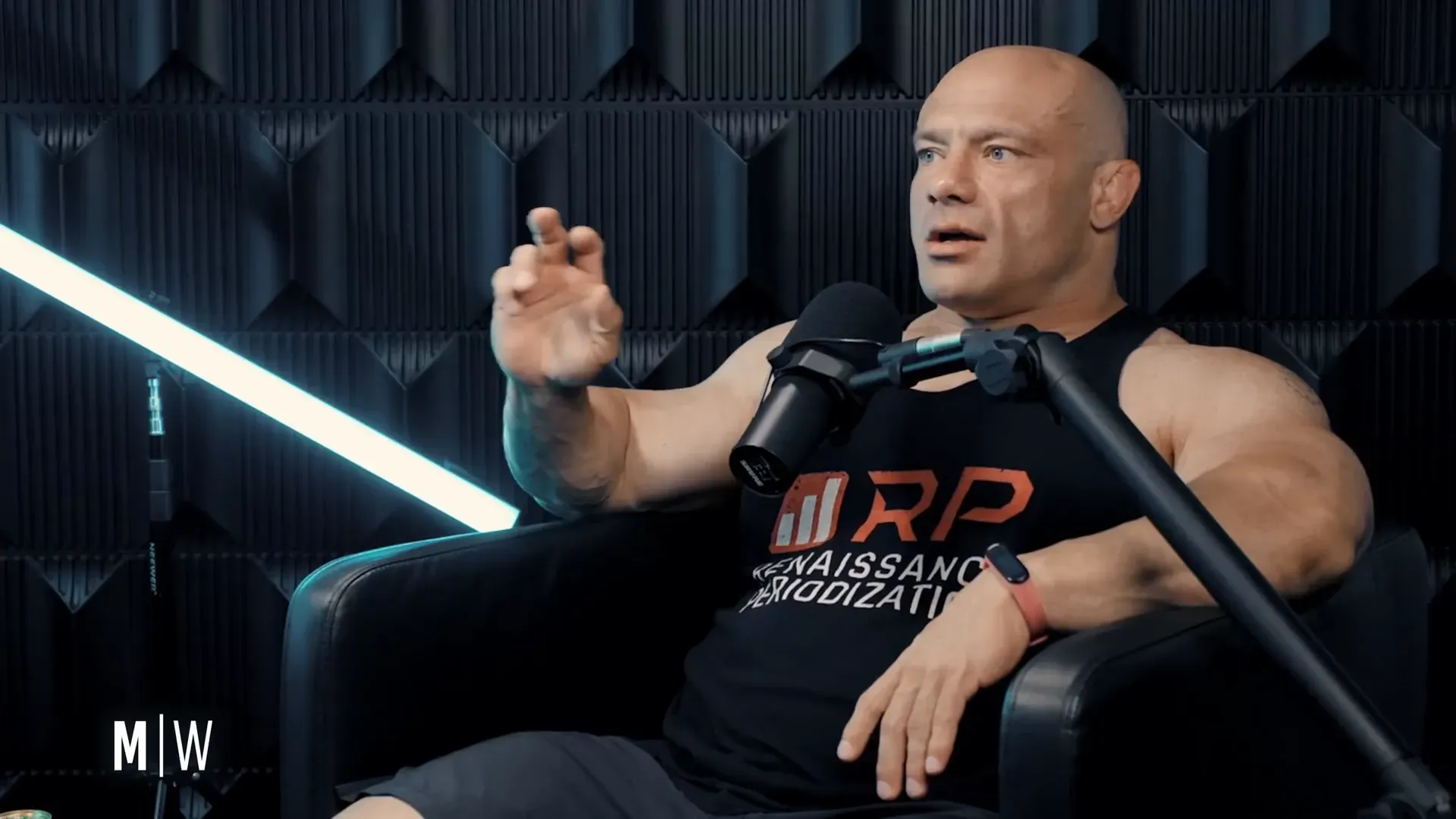Dr. Mike Israetel on Fat Loss: Losing Weight Effectively
The Ultimate Guide to Getting Lean: Mike Israetel's Expert Tips on the Modern Wisdom Podcast

Key Takeaways
- Fat loss fundamentally relies on creating a calorie deficit
- Weigh yourself regularly, but avoid daily obsessing over fluctuations
- Protein intake is crucial for maintaining muscle during fat loss
- The quality of food matters, but so does the quantity
- The modern food environment contributes significantly to overeating and obesity, but with the right strategies, you can lose fat reliably
In this comprehensive interview on the Modern Wisdom podcast, Dr. Mike Israetel shares his expert insights on fat loss.
He explains the fundamental physiology behind it and the essential strategies to achieve your weight loss goals.
Here, you can discover how to effectively manage your diet, exercise, and lifestyle with practical tips from Mike Israetel on fat loss.
Related:
- Dr. Mike Israetel on Muscle Building
- Low-Carb Bodybuilding: Pros, Cons, 7-Day Meal Plan, Myths & More
- 7-Day Bodybuilding Meal Plan: Foods to Eat & Avoid for Muscle Gain
In a Nutshell—Dr. Mike Israetel on Fat Loss
Regularly weighing yourself can help track progress without the stress of daily fluctuations. Additionally, you may want to:
‧ Set smaller goals
‧ Focus on protein intake
‧ Maintain a consistent meal schedule
For those with a sweet tooth, incorporate low-calorie sweeteners and fresh fruits. After dieting, transition smoothly into maintenance by gradually increasing your caloric intake while sticking to familiar foods.
Modern society's food environment plays a significant role in the obesity epidemic, with easy access to high-calorie foods. However, with the right strategies, you can navigate these challenges and lose fat effectively.
Mike Israetel on Fat Loss: The Ultimate Guide to Losing Weight Effectively

Fundamental Physiology of Fat Loss
Understanding fat loss starts with physiology. Your body fat serves essential functions. It lubricates joints and protects internal organs. But primarily, it's an energy reservoir. In our ancestral past, food availability was unpredictable. This adaptability allowed our ancestors to survive through periods of starvation.
When you eat, your body breaks down food into usable molecules. These include amino acids for proteins, carbohydrates for energy, and fats for storage. Your body prioritizes immediate needs first. Once those are met, excess calories go into fat storage. This is where the challenge lies when trying to lose weight.
Do Calories Matter?
Yes, calories are the cornerstone of fat loss. If you consume more calories than you burn, you gain fat. Conversely, if you burn more than you consume, you lose fat. This simple concept underlies all weight loss efforts. Despite this, some argue that calories don't matter, often misunderstanding their experiences with diets.
Many have lost weight without tracking calories, attributing it to diet changes or exercise. However, the reality is that they created a calorie deficit without realizing it. It's crucial to understand that while you may not need to count calories strictly, they fundamentally determine your weight change.
How Often You Should Weigh Yourself
Weighing yourself can be tricky. For those not actively trying to lose weight, weighing yourself once a month might suffice. This helps you catch any unexpected weight gain. For those on a fat loss journey, weigh yourself weekly. This provides a clearer picture of trends while avoiding the pitfalls of daily fluctuations.
Water retention and other factors can affect your weight, making daily weigh-ins misleading. By weighing yourself regularly but not obsessively, you can track your progress without the added stress.
The Truth About Set Point Theory
Set point theory suggests your body has a preferred weight. However, this isn't an absolute. Instead, it's more about a range where your body feels comfortable. Factors like diet, lifestyle, and environment influence where that range lies. For example, living in a food-rich environment can raise your set point.
It's crucial to understand that you can change your settling point by altering your habits. If you consistently eat healthier and exercise, your body can adapt to a lower weight range over time.
Why Modern Society is So Fat

Today's food environment is vastly different from the past. Food is tastier, more calorie-dense, and readily available. This abundance leads to overeating. Many people consume hyper-palatable foods without realizing the caloric impact. The combination of convenience and taste drives consumption beyond necessary limits.
In the past, food scarcity shaped our eating habits. Now, the opposite is true. The ease of access to high-calorie foods contributes significantly to the obesity epidemic.
Managing Protein, Carbs & Fat
When thinking about macronutrients, protein is essential. It supports muscle maintenance and overall health. Aim for around half a gram of protein per pound of body weight. For most, this is sufficient to preserve muscle while losing fat.
Carbohydrates and fats are more flexible. You can adjust their intake based on your activity level and personal preference. Some people thrive on higher carbs, while others do better with more fats. The key is to ensure you're getting adequate protein and managing your calorie intake.
Are Seed Oils Actually Bad for Health?

Seed oils have faced criticism, often unfairly. Research shows that when used properly, they can be part of a healthy diet. They offer essential fatty acids that support overall health. It's essential to focus on the type of fats consumed rather than demonizing specific sources.
Moderation is key. While trans fats and excessively processed sources should be avoided, polyunsaturated and monounsaturated fats can be beneficial. Incorporating a variety of healthy fats can support your health and dietary goals.
Optimal Mealtimes for Weight Loss

When it comes to meal timing, the frequency of your meals doesn't significantly impact fat loss. Studies show that whether you eat six small meals a day or practice alternate day fasting, the calorie balance remains the same. The key factor is maintaining a caloric deficit. If you're focused on losing weight without worrying about muscle retention, you can choose a meal frequency that suits your lifestyle. Whether it's one meal a day or seven, what matters is your total calorie intake.
However, if you're looking to maintain or build muscle while losing fat, spreading your meals throughout the day is beneficial. Aim for at least four meals a day, each high in protein. This approach optimizes muscle growth and retention. Beyond four meals, research indicates that the benefits plateau. So if you're thriving on four meals, don't feel pressured to increase that number.
Best Foods to Make Fat Loss Easier

When selecting foods for fat loss, it's essential to focus on options that provide satiety without excessive calories. Contrary to popular belief, no individual food is inherently bad for fat loss. Instead, consider the overall dietary pattern. For instance, sugars are not the enemy. They won't automatically lead you to gain weight. It's crucial to understand that calorie balance is the primary determinant of fat loss.
Instead of obsessing over specific food groups, choose foods that are less palatable and more filling. This strategy helps control hunger. Think of veggies, fruits, whole grains, and lean meats. These foods often take longer to digest and provide more volume for fewer calories. As you progress through a diet, you can adjust the palatability of your meals while maintaining their filling nature.
How Our Body Expends Calories
Understanding energy expenditure is critical for effective fat loss. The concept of G flux highlights that consuming more calories while maintaining high activity levels can lead to better body composition. It's not just about eating less; it's about balancing intake with expenditure. For example, if you're active and consume more calories, you may still see fat loss while maintaining muscle mass.
Most people, regardless of their body composition, have similar physical activity levels. In fact, the average person might not be as sedentary as believed. Engaging in everyday activities, like walking or playing with kids, contributes to your total daily energy expenditure. Therefore, finding ways to incorporate movement into your day can significantly impact your fat loss journey.
The Facts About Cardio for Fat Loss

Cardio can be a useful tool for burning calories, but it’s not the only option. The type of cardio you choose should align with your preferences and lifestyle. Walking, swimming, or cycling can all be effective ways to increase your calorie burn without the monotony of traditional cardio machines. Ultimately, the best cardio is the one you can stick with consistently.
Many people think high-intensity workouts are the key to burning fat. While they can be effective, sustainability is more important. If you can enjoy lower intensity activities that fit into your daily life, that’s often the better choice. The afterburn effect from intense cardio is often overstated. Focus on finding a rhythm that works for you.
Does Resistance Training Help You Lose Weight?
Resistance training is crucial, especially when losing fat. It helps preserve muscle mass, which is vital for maintaining metabolic rate. If you lose weight without resistance training, you risk losing muscle along with fat. Studies show that those who incorporate weight training into their fat loss plans tend to retain significantly more muscle.
For those new to weight training, starting a program while dieting can lead to muscle gain and fat loss simultaneously. This phenomenon is especially noticeable in beginners. Even experienced lifters may find that maintaining their strength is possible during a caloric deficit as long as they continue to train consistently.
The Key to Getting Abs

Visible abs are often more about body fat percentage than about doing endless crunches. Everyone has abdominal muscles, but they might be hidden under a layer of fat. The saying “abs are made in the kitchen, not on the gym floor” holds true. Focus on creating a caloric deficit through diet and exercise to reveal those abs.
For those who want to train their abs, treat them like any other muscle group. Train them regularly with resistance exercises. However, keep in mind that direct ab workouts won’t replace the need for overall fat loss to see definition. Consistency in your training and diet will ultimately lead to the best results.
Supplements That Help With Fat Loss
While many supplements claim to aid in fat loss, the reality is that few are effective. Modern anorectics, such as GLP-1 agonists, can significantly help reduce appetite and make dieting easier. However, it’s essential to manage their use carefully to avoid rebound hunger once you stop taking them.
Stimulants like caffeine can assist with fat loss by increasing energy expenditure and suppressing appetite. However, they come with potential side effects and the risk of developing a tolerance. Ultimately, the most effective fat loss strategy remains a well-balanced diet combined with regular physical activity.
Why Do So Many People Fail at Diets?

Many people struggle with diets. This isn't a surprise. It's not just about willpower. The food we eat today is engineered to be delicious and highly palatable. Our evolutionary background makes us crave these foods. When faced with tasty options, many people give in. It’s not a failure of character; it's biology.
Take the example of modern diets. They often involve extreme restrictions. When people set lofty goals, like losing 30 pounds in a month, they set themselves up for failure. A more realistic goal, like losing 15 pounds over three months, is far more sustainable. This approach reduces feelings of hunger and deprivation, making it easier to stick to the plan.
Mike’s Favourite Fat Loss Tactics

Mike Israetel emphasizes the importance of protein in your diet. Protein helps maintain muscle mass while losing fat. Aim for around 0.5 grams of protein per pound of body weight. This strategy ensures your body has enough building blocks to retain muscle during the calorie deficit.
Another tactic is to eat more fibrous foods. Vegetables and fruits help you feel fuller without adding many calories. They add volume to your meals. This makes it easier to manage hunger while dieting.
How to Lose Fat With a Sweet Tooth
If you have a sweet tooth, don’t worry. You can still enjoy treats while losing weight. Mike suggests using non-nutritive sweeteners, like Stevia or monk fruit. These sweeteners can satisfy your cravings without the calories. They are safe and effective, allowing you to enjoy sweetness without the guilt.
Fresh fruits are also a great option. They are naturally sweet and low in calories. You can fill up on berries, apples, or pears without derailing your diet. Brands like Halo Top and Enlightened Ice Cream offer low-calorie alternatives that taste great. These products let you indulge without the calorie overload.
Diet Transitions & Diet Breaks
Once you finish a diet, the real challenge begins. Transitioning back to maintenance is crucial. Many people regain weight because they return to old habits. After a diet, maintain your intake with the same types of foods you’ve been eating. This helps your body adjust without shocking it.
Give yourself a few weeks of maintenance before reintroducing high-calorie foods. This helps prevent rapid weight gain. Maintain a balance; if you find yourself gaining weight, reduce the junk food. If you’re losing weight, you can allow a bit more flexibility.
My opinion on Mike Israetel on Fat Loss
I believe Mike Israetel's insights on fat loss are rooted in solid science. Just like Dr. Mike, I believe fat loss is primarily about understanding energy balance.
Many people focus on the latest diet trends, but at the core, it always comes down to calories. Yes, the type of food you eat matters, but the quantity is king. I often hear people say that tracking calories is unnecessary or even harmful. They argue that intuitive eating is the way forward. While I appreciate this perspective, I disagree. Without some form of awareness about calorie intake, it is easy to overconsume, especially in our food-abundant society.
Opponents might say that counting calories can lead to an unhealthy relationship with food. I respect that viewpoint, but I think it can be done healthily. Tracking calories doesn't mean obsessing over every bite. It means having a clear understanding of what you're consuming. This knowledge empowers you to make better choices. It helps you stay accountable and achieve your goals.
Concluding on Fat Loss
Fat loss is a journey that requires patience and strategy.
It's a complex process influenced by biology, psychology, and lifestyle. It’s not just about willpower; it’s about understanding your body and creating sustainable habits.
The Dr. Muscle app can help you automate your tracking and provide personalized guidance throughout your fat loss journey. With its advanced features, it makes the process easier and more efficient.
If you're ready to take your fitness to the next level, check out the Dr. Muscle app and get a discount at Dr. Muscle.
FAQ
Q: Can I eat carbs while dieting?
A: Yes! Carbs can be part of a healthy diet. The key is moderation and choosing the right types of carbs. Focus on whole grains, fruits, and vegetables.
Q: How often should I weigh myself?
A: Weigh yourself weekly to track trends. Daily fluctuations can cause unnecessary stress. Weekly weigh-ins provide a clearer picture of your progress.
Q: Can I lose fat without counting calories?
A: Yes, but understanding your caloric intake is beneficial. Tracking helps create awareness and can guide your food choices.
Q: Is it okay to have cheat meals?
A: Absolutely! Just be mindful of how often you indulge. Cheat meals can help maintain your sanity and satisfaction with your diet.
Q: How do I deal with cravings?
A: Focus on high-protein and high-fiber foods. Also, consider using non-nutritive sweeteners to satisfy your sweet tooth without the calories.

